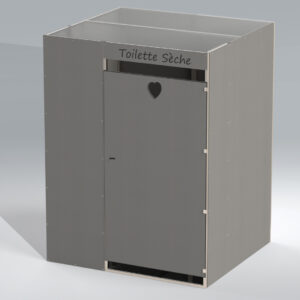Some of you use sawdust for composting toilets but may not find this material readily available.
In our region, which includes Lot with neighboring Dordogne, sawmills are plentiful, and we easily find this product, which, a few years ago, was considered waste that sawyers didn’t know how to dispose of!
Next to the sawmills, you could see large piles smoking day and night throughout the year. Sawdust disposal used to happen through open-air incineration. These practices are now outdated and prohibited.
Sawdust is no longer waste but a byproduct with value.
Indeed, sawdust is now used for heating kilns, which dry wooden boards. It is also used in communal boilers for home heating and in various industrial sectors as a standalone energy source.
Gone are the days when these byproducts were considered waste.
Why Sawdust Rather Than Wood Shavings in Composting Toilets?
We consider that sawdust is more effective than wood shavings in blocking odors. It is also more convenient for handling because wood shavings tend to fluff up a lot, making them harder to put into the composting toilet’s receptacle. Additionally, a scoop loads more easily with sawdust.
At an equal volume, sawdust for composting toilets will last longer. As you can see, we have a bias! Nevertheless, we have no shortage of wood shavings in our workshop. Still, we have decided to give them another path of valorization. Our wood shavings are collected by the neighboring farm, “La Ferme de Siffray,” which practices organic and sustainable agriculture, as bedding for animals. This bedding is transformed into compost, closing the loop!
Returning to sawdust, we ourselves produce very little sawdust. In fact, it is mixed with wood shavings during machine vacuuming.
The Origin of the Sawdust?
The sawdust you put into your composting toilets must be clean, in the chemical sense of the term, originating from untreated wood. Nowadays, it is becoming increasingly difficult to find untreated wood. Nearly all the woods offered by building material merchants are treated against insects, fungi, decay, etc. with products that should be approached with caution.
Be cautious with sawdust and wood shavings from carpenters; few work with healthy wood. Even among our colleagues who manufacture composting toilets, you can find products made from particleboard. OSB or others, certainly inexpensive but loaded with glue, which I won’t elaborate on! That’s why we only work with untreated solid wood directly from local sawmills and sourced from our forests.
The ideal option for you is to source from a sawmill, or if you don’t have one nearby, we can supply you with it in 120-liter bags.


















